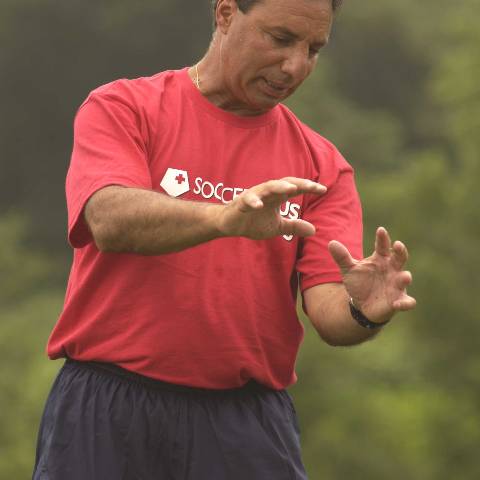As the drills began under the hot sun on Saturday afternoon [July 2] on the Darlington campus, youth soccer players from all across the country worked on their skills as a man in a red T-shirt slowly walked among them.
Some of those players may not have realized that they were in the presence of one of the most famous soccer coaches in U.S. history.
The
SoccerPlus Camp is in Rome this week, with 125 players learning from some top-notch collegiate and national level instructors, including former U.S. national women’s team coach Tony DiCicco.
While many sports camps often operate at one site and the players travel to the camp, DiCicco’s SoccerPlus camp is a series of clinics that visit different sites across the country, in essence taking the camp to the kids.
This week, in addition to the camp at Darlington, SoccerPlus has a session at Eastern Illinois University.
It may seem odd that a coach like DiCicco — who won a gold medal coaching the U.S. women’s team at the 1996 Olympics and also led the U.S. to the 1999 Women’s World Cup title — would be spending his time on a field in Rome, teaching the finer points of goalkeeping on a muggy holiday weekend.
But for DiCicco, the chance to work in small-group settings with youth players is exactly what he wants to be doing at this point in his career.
“I’m re-inventing myself,” DiCicco said with a smile during a break in Saturday’s practice session. “I feel like doing these camps, I’m coming back to my roots. One of the aspects of coaching that you enjoy the most is seeing players grow and improve, and teaching at camps is a great way to do that.
“I can’t believe how much this has satisfied my career.” DiCicco started the SoccerPlus program back in 1981, hoping to provide some extra instruction to youth goalkeepers.
“We started our program as a goalkeeper school,” DiCicco said. “It was hard to just stay in one area and conduct camp, since there are only so many goalkeepers in a given community.
“So we started to travel and brought the camp to the players. We later added a field player academy, and we have camps now from coast to coast.”
So what draws a veteran coach, who won over 100 matches with the U.S. national team, to fields all over the country to teach fundamentals to middle and high school players?
“The truth is, when I come out here and work with these kids, I see the same heart of a champion that I saw with Mia Hamm or Brandy Chastain on the national team,” DiCicco said. “These players have the same determination, the same exhilaration about playing the game, and that’s just as gratifying to me.”
But DiCicco said that the SoccerPlus camps have evolved into much more over the last few years. Now, there are programs to help players not only be successful on the field, but successful in life.
“We’ve created an education center where we teach life seminars,” DiCicco said. “We have programs about health, HIV education and prevention, money management, and other topics.
“These kids look up to us, and we have a responsibility to teach them about life as well as soccer,” he said. DiCicco grew up in Wethersfield, Conn., where he still lives with his wife and four sons.
Since resigning as coach of U.S. women’s national team in 1999, he has served as commissioner of the Women’s United Soccer Association.
Since the three-year old league suspended operations in 2003, DiCicco has been in an advisory capacity to a group of people who are working to revive a women’s pro soccer league.
He is also the technical director and a coach in a youth soccer league in Connecticut, and he said that he has noticed a steady growth in soccer on the youth, club and college level since he played at Springfield College in Massachusetts in the 1960s.
“We’ve become a little more of a soccer culture now,” he said. “You can tell it has grown because places where soccer used to not be that big, now the sport has its place and is developing a niche.”
*
Written by Jeff Gable, Rome News-Tribune Sports Writer, published 7/3/2005

